Analysing Organisational Behaviour: Culture, Power, Politics - Tesco
VerifiedAdded on 2023/06/12
|15
|5013
|287
Report
AI Summary
This report provides an analysis of organisational behaviour, focusing on how organisational culture, power, and politics affect individual and team behaviour within Tesco. It explores Hofstede's cultural dimensions theory, task culture, person culture, and power culture, along with different types of power such as legitimate and expert power. The report also examines the impact of workplace politics, including various network types. Furthermore, it assesses content and interaction hypotheses of motivation, including Maslow's hierarchy of needs and the ERG theory, and evaluates the equity theory of motivation. The study concludes by discussing team development theories and models, offering insights into creating effective teams and fostering a positive organisational environment. Desklib provides access to a wealth of resources, including similar reports and solved assignments, to aid students in their studies.
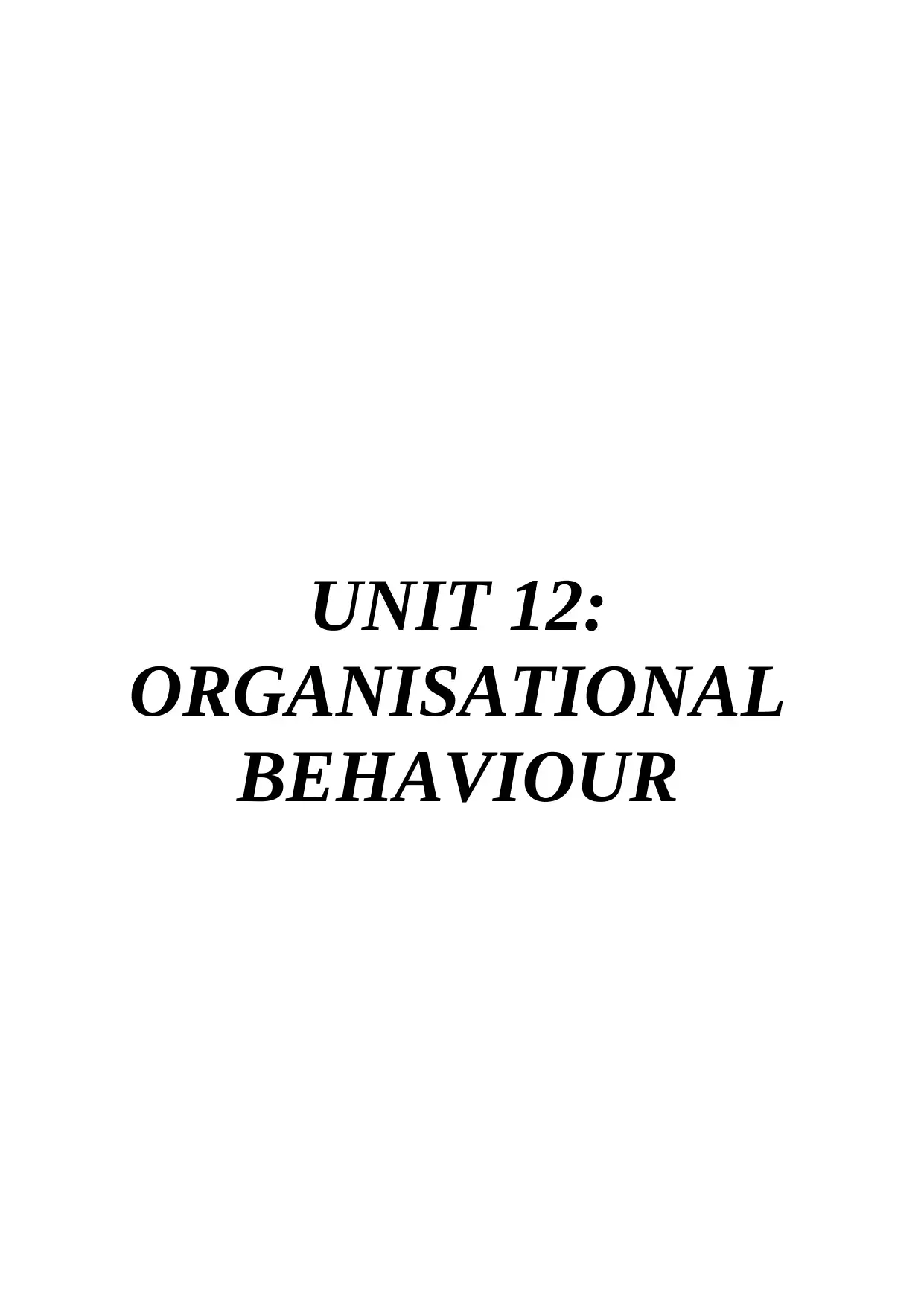
UNIT 12:
ORGANISATIONAL
BEHAVIOUR
ORGANISATIONAL
BEHAVIOUR
Secure Best Marks with AI Grader
Need help grading? Try our AI Grader for instant feedback on your assignments.
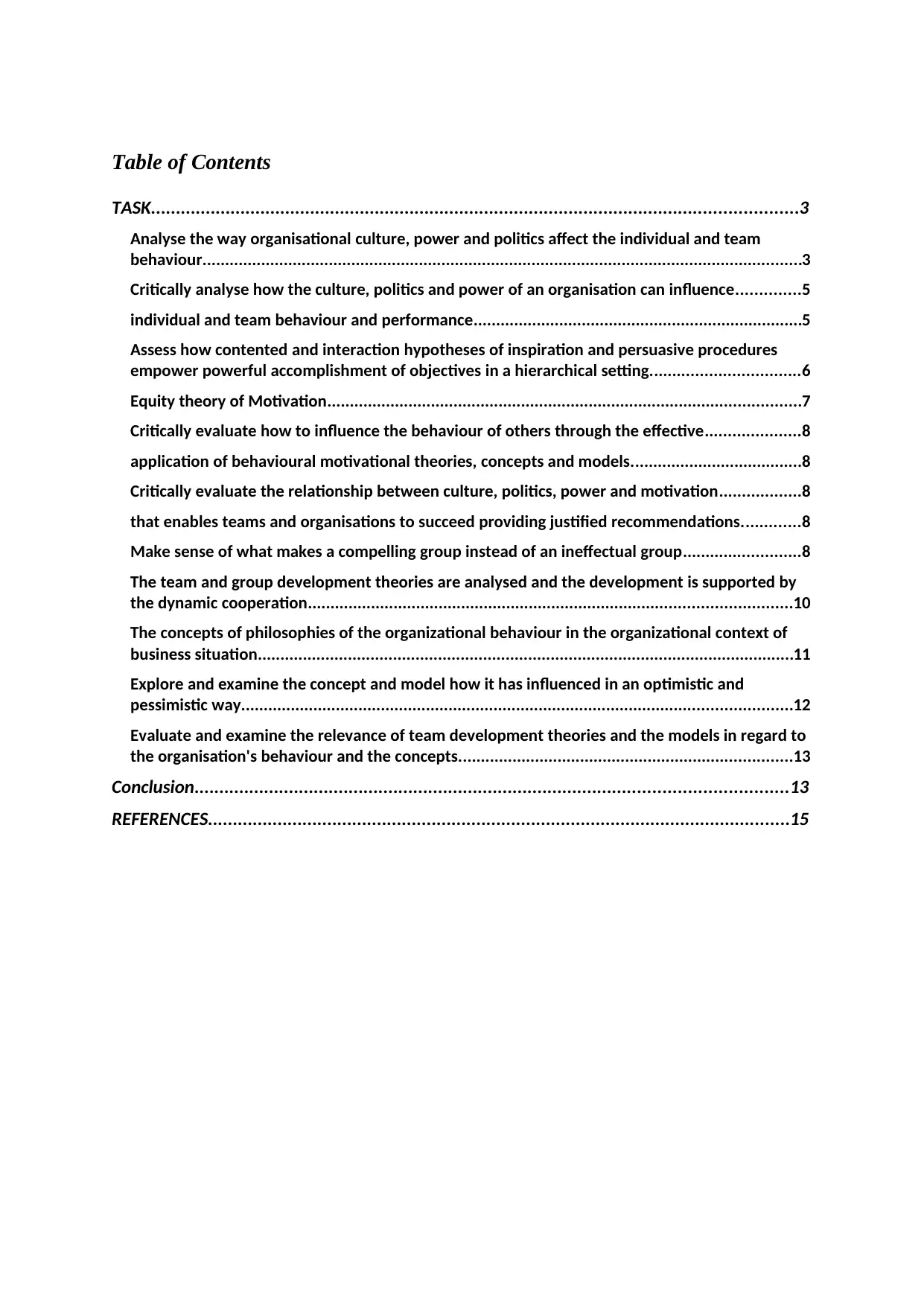
Table of Contents
TASK..................................................................................................................................3
Analyse the way organisational culture, power and politics affect the individual and team
behaviour.....................................................................................................................................3
Critically analyse how the culture, politics and power of an organisation can influence..............5
individual and team behaviour and performance.........................................................................5
Assess how contented and interaction hypotheses of inspiration and persuasive procedures
empower powerful accomplishment of objectives in a hierarchical setting.................................6
Equity theory of Motivation.........................................................................................................7
Critically evaluate how to influence the behaviour of others through the effective.....................8
application of behavioural motivational theories, concepts and models......................................8
Critically evaluate the relationship between culture, politics, power and motivation..................8
that enables teams and organisations to succeed providing justified recommendations.............8
Make sense of what makes a compelling group instead of an ineffectual group..........................8
The team and group development theories are analysed and the development is supported by
the dynamic cooperation...........................................................................................................10
The concepts of philosophies of the organizational behaviour in the organizational context of
business situation.......................................................................................................................11
Explore and examine the concept and model how it has influenced in an optimistic and
pessimistic way..........................................................................................................................12
Evaluate and examine the relevance of team development theories and the models in regard to
the organisation's behaviour and the concepts..........................................................................13
Conclusion.......................................................................................................................13
REFERENCES.....................................................................................................................15
TASK..................................................................................................................................3
Analyse the way organisational culture, power and politics affect the individual and team
behaviour.....................................................................................................................................3
Critically analyse how the culture, politics and power of an organisation can influence..............5
individual and team behaviour and performance.........................................................................5
Assess how contented and interaction hypotheses of inspiration and persuasive procedures
empower powerful accomplishment of objectives in a hierarchical setting.................................6
Equity theory of Motivation.........................................................................................................7
Critically evaluate how to influence the behaviour of others through the effective.....................8
application of behavioural motivational theories, concepts and models......................................8
Critically evaluate the relationship between culture, politics, power and motivation..................8
that enables teams and organisations to succeed providing justified recommendations.............8
Make sense of what makes a compelling group instead of an ineffectual group..........................8
The team and group development theories are analysed and the development is supported by
the dynamic cooperation...........................................................................................................10
The concepts of philosophies of the organizational behaviour in the organizational context of
business situation.......................................................................................................................11
Explore and examine the concept and model how it has influenced in an optimistic and
pessimistic way..........................................................................................................................12
Evaluate and examine the relevance of team development theories and the models in regard to
the organisation's behaviour and the concepts..........................................................................13
Conclusion.......................................................................................................................13
REFERENCES.....................................................................................................................15
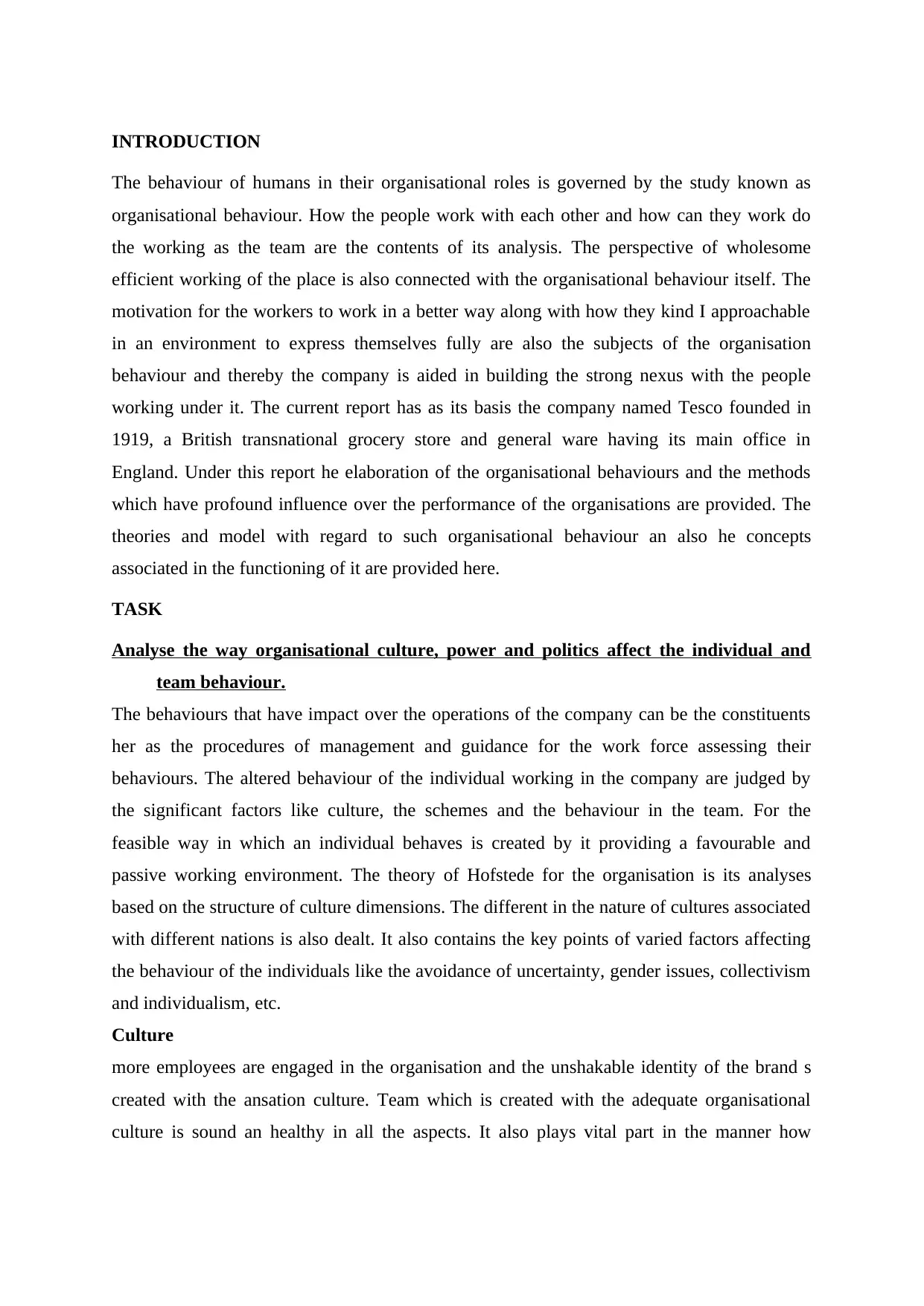
INTRODUCTION
The behaviour of humans in their organisational roles is governed by the study known as
organisational behaviour. How the people work with each other and how can they work do
the working as the team are the contents of its analysis. The perspective of wholesome
efficient working of the place is also connected with the organisational behaviour itself. The
motivation for the workers to work in a better way along with how they kind I approachable
in an environment to express themselves fully are also the subjects of the organisation
behaviour and thereby the company is aided in building the strong nexus with the people
working under it. The current report has as its basis the company named Tesco founded in
1919, a British transnational grocery store and general ware having its main office in
England. Under this report he elaboration of the organisational behaviours and the methods
which have profound influence over the performance of the organisations are provided. The
theories and model with regard to such organisational behaviour an also he concepts
associated in the functioning of it are provided here.
TASK
Analyse the way organisational culture, power and politics affect the individual and
team behaviour.
The behaviours that have impact over the operations of the company can be the constituents
her as the procedures of management and guidance for the work force assessing their
behaviours. The altered behaviour of the individual working in the company are judged by
the significant factors like culture, the schemes and the behaviour in the team. For the
feasible way in which an individual behaves is created by it providing a favourable and
passive working environment. The theory of Hofstede for the organisation is its analyses
based on the structure of culture dimensions. The different in the nature of cultures associated
with different nations is also dealt. It also contains the key points of varied factors affecting
the behaviour of the individuals like the avoidance of uncertainty, gender issues, collectivism
and individualism, etc.
Culture
more employees are engaged in the organisation and the unshakable identity of the brand s
created with the ansation culture. Team which is created with the adequate organisational
culture is sound an healthy in all the aspects. It also plays vital part in the manner how
The behaviour of humans in their organisational roles is governed by the study known as
organisational behaviour. How the people work with each other and how can they work do
the working as the team are the contents of its analysis. The perspective of wholesome
efficient working of the place is also connected with the organisational behaviour itself. The
motivation for the workers to work in a better way along with how they kind I approachable
in an environment to express themselves fully are also the subjects of the organisation
behaviour and thereby the company is aided in building the strong nexus with the people
working under it. The current report has as its basis the company named Tesco founded in
1919, a British transnational grocery store and general ware having its main office in
England. Under this report he elaboration of the organisational behaviours and the methods
which have profound influence over the performance of the organisations are provided. The
theories and model with regard to such organisational behaviour an also he concepts
associated in the functioning of it are provided here.
TASK
Analyse the way organisational culture, power and politics affect the individual and
team behaviour.
The behaviours that have impact over the operations of the company can be the constituents
her as the procedures of management and guidance for the work force assessing their
behaviours. The altered behaviour of the individual working in the company are judged by
the significant factors like culture, the schemes and the behaviour in the team. For the
feasible way in which an individual behaves is created by it providing a favourable and
passive working environment. The theory of Hofstede for the organisation is its analyses
based on the structure of culture dimensions. The different in the nature of cultures associated
with different nations is also dealt. It also contains the key points of varied factors affecting
the behaviour of the individuals like the avoidance of uncertainty, gender issues, collectivism
and individualism, etc.
Culture
more employees are engaged in the organisation and the unshakable identity of the brand s
created with the ansation culture. Team which is created with the adequate organisational
culture is sound an healthy in all the aspects. It also plays vital part in the manner how
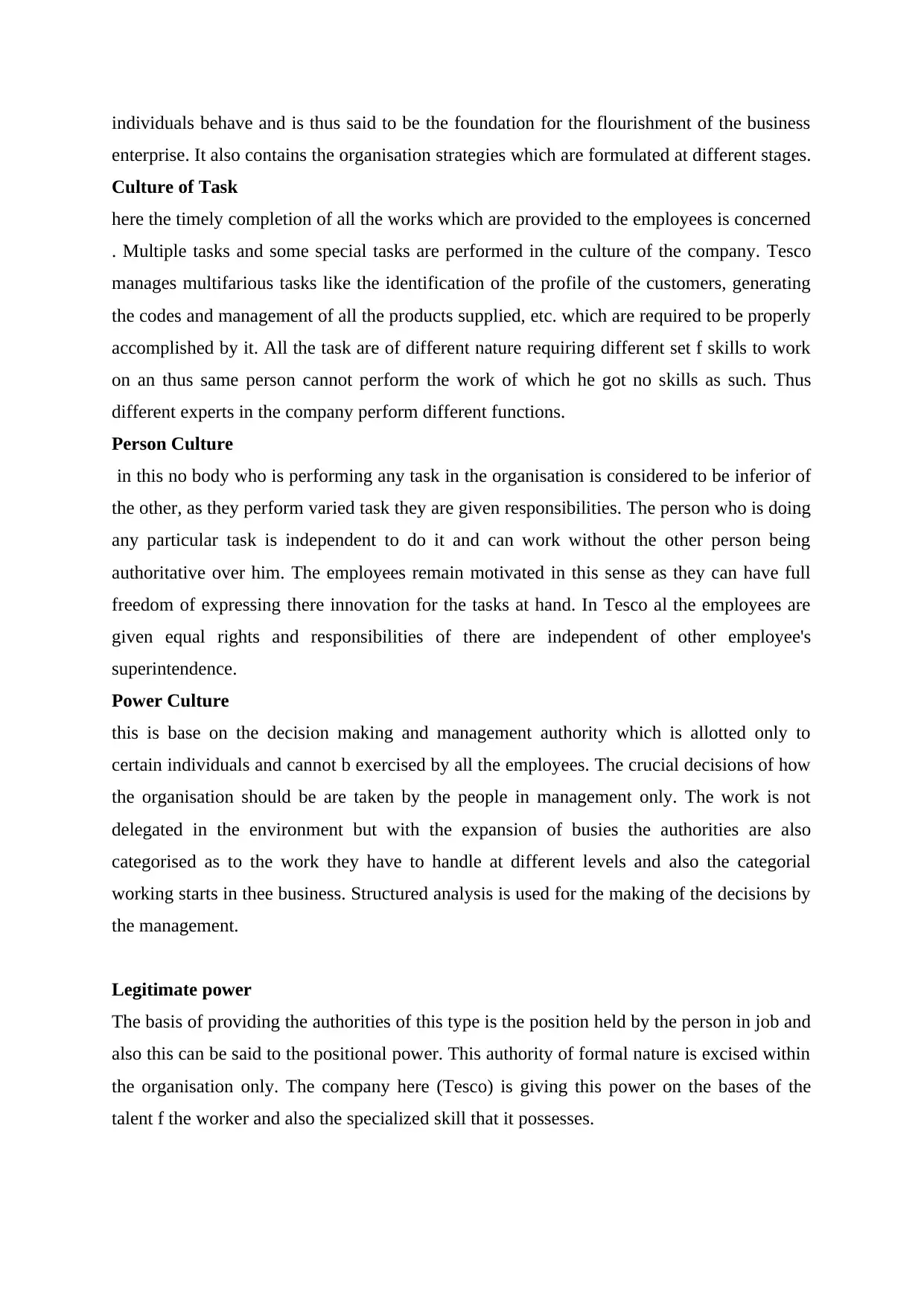
individuals behave and is thus said to be the foundation for the flourishment of the business
enterprise. It also contains the organisation strategies which are formulated at different stages.
Culture of Task
here the timely completion of all the works which are provided to the employees is concerned
. Multiple tasks and some special tasks are performed in the culture of the company. Tesco
manages multifarious tasks like the identification of the profile of the customers, generating
the codes and management of all the products supplied, etc. which are required to be properly
accomplished by it. All the task are of different nature requiring different set f skills to work
on an thus same person cannot perform the work of which he got no skills as such. Thus
different experts in the company perform different functions.
Person Culture
in this no body who is performing any task in the organisation is considered to be inferior of
the other, as they perform varied task they are given responsibilities. The person who is doing
any particular task is independent to do it and can work without the other person being
authoritative over him. The employees remain motivated in this sense as they can have full
freedom of expressing there innovation for the tasks at hand. In Tesco al the employees are
given equal rights and responsibilities of there are independent of other employee's
superintendence.
Power Culture
this is base on the decision making and management authority which is allotted only to
certain individuals and cannot b exercised by all the employees. The crucial decisions of how
the organisation should be are taken by the people in management only. The work is not
delegated in the environment but with the expansion of busies the authorities are also
categorised as to the work they have to handle at different levels and also the categorial
working starts in thee business. Structured analysis is used for the making of the decisions by
the management.
Legitimate power
The basis of providing the authorities of this type is the position held by the person in job and
also this can be said to the positional power. This authority of formal nature is excised within
the organisation only. The company here (Tesco) is giving this power on the bases of the
talent f the worker and also the specialized skill that it possesses.
enterprise. It also contains the organisation strategies which are formulated at different stages.
Culture of Task
here the timely completion of all the works which are provided to the employees is concerned
. Multiple tasks and some special tasks are performed in the culture of the company. Tesco
manages multifarious tasks like the identification of the profile of the customers, generating
the codes and management of all the products supplied, etc. which are required to be properly
accomplished by it. All the task are of different nature requiring different set f skills to work
on an thus same person cannot perform the work of which he got no skills as such. Thus
different experts in the company perform different functions.
Person Culture
in this no body who is performing any task in the organisation is considered to be inferior of
the other, as they perform varied task they are given responsibilities. The person who is doing
any particular task is independent to do it and can work without the other person being
authoritative over him. The employees remain motivated in this sense as they can have full
freedom of expressing there innovation for the tasks at hand. In Tesco al the employees are
given equal rights and responsibilities of there are independent of other employee's
superintendence.
Power Culture
this is base on the decision making and management authority which is allotted only to
certain individuals and cannot b exercised by all the employees. The crucial decisions of how
the organisation should be are taken by the people in management only. The work is not
delegated in the environment but with the expansion of busies the authorities are also
categorised as to the work they have to handle at different levels and also the categorial
working starts in thee business. Structured analysis is used for the making of the decisions by
the management.
Legitimate power
The basis of providing the authorities of this type is the position held by the person in job and
also this can be said to the positional power. This authority of formal nature is excised within
the organisation only. The company here (Tesco) is giving this power on the bases of the
talent f the worker and also the specialized skill that it possesses.
Secure Best Marks with AI Grader
Need help grading? Try our AI Grader for instant feedback on your assignments.
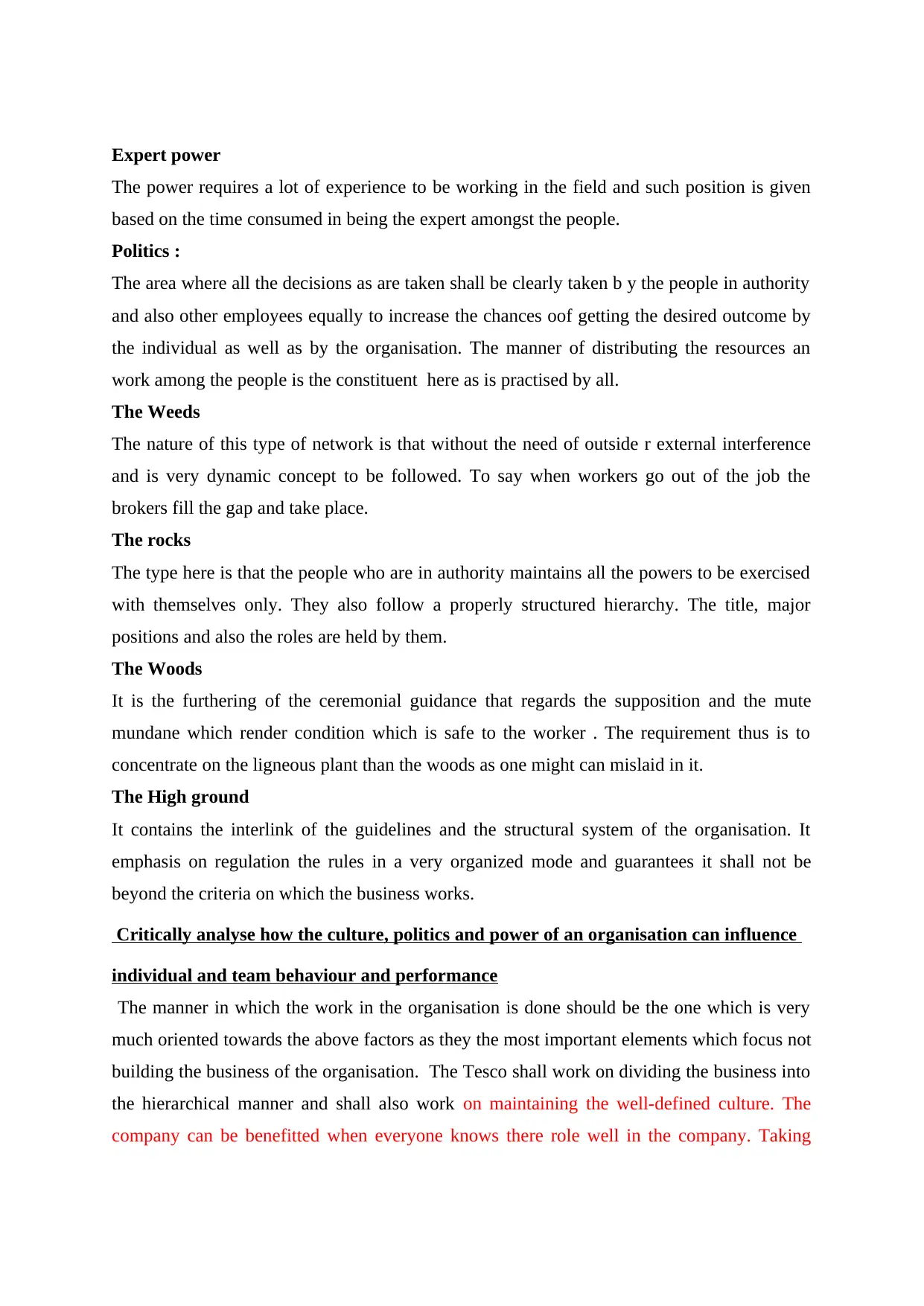
Expert power
The power requires a lot of experience to be working in the field and such position is given
based on the time consumed in being the expert amongst the people.
Politics :
The area where all the decisions as are taken shall be clearly taken b y the people in authority
and also other employees equally to increase the chances oof getting the desired outcome by
the individual as well as by the organisation. The manner of distributing the resources an
work among the people is the constituent here as is practised by all.
The Weeds
The nature of this type of network is that without the need of outside r external interference
and is very dynamic concept to be followed. To say when workers go out of the job the
brokers fill the gap and take place.
The rocks
The type here is that the people who are in authority maintains all the powers to be exercised
with themselves only. They also follow a properly structured hierarchy. The title, major
positions and also the roles are held by them.
The Woods
It is the furthering of the ceremonial guidance that regards the supposition and the mute
mundane which render condition which is safe to the worker . The requirement thus is to
concentrate on the ligneous plant than the woods as one might can mislaid in it.
The High ground
It contains the interlink of the guidelines and the structural system of the organisation. It
emphasis on regulation the rules in a very organized mode and guarantees it shall not be
beyond the criteria on which the business works.
Critically analyse how the culture, politics and power of an organisation can influence
individual and team behaviour and performance
The manner in which the work in the organisation is done should be the one which is very
much oriented towards the above factors as they the most important elements which focus not
building the business of the organisation. The Tesco shall work on dividing the business into
the hierarchical manner and shall also work on maintaining the well-defined culture. The
company can be benefitted when everyone knows there role well in the company. Taking
The power requires a lot of experience to be working in the field and such position is given
based on the time consumed in being the expert amongst the people.
Politics :
The area where all the decisions as are taken shall be clearly taken b y the people in authority
and also other employees equally to increase the chances oof getting the desired outcome by
the individual as well as by the organisation. The manner of distributing the resources an
work among the people is the constituent here as is practised by all.
The Weeds
The nature of this type of network is that without the need of outside r external interference
and is very dynamic concept to be followed. To say when workers go out of the job the
brokers fill the gap and take place.
The rocks
The type here is that the people who are in authority maintains all the powers to be exercised
with themselves only. They also follow a properly structured hierarchy. The title, major
positions and also the roles are held by them.
The Woods
It is the furthering of the ceremonial guidance that regards the supposition and the mute
mundane which render condition which is safe to the worker . The requirement thus is to
concentrate on the ligneous plant than the woods as one might can mislaid in it.
The High ground
It contains the interlink of the guidelines and the structural system of the organisation. It
emphasis on regulation the rules in a very organized mode and guarantees it shall not be
beyond the criteria on which the business works.
Critically analyse how the culture, politics and power of an organisation can influence
individual and team behaviour and performance
The manner in which the work in the organisation is done should be the one which is very
much oriented towards the above factors as they the most important elements which focus not
building the business of the organisation. The Tesco shall work on dividing the business into
the hierarchical manner and shall also work on maintaining the well-defined culture. The
company can be benefitted when everyone knows there role well in the company. Taking
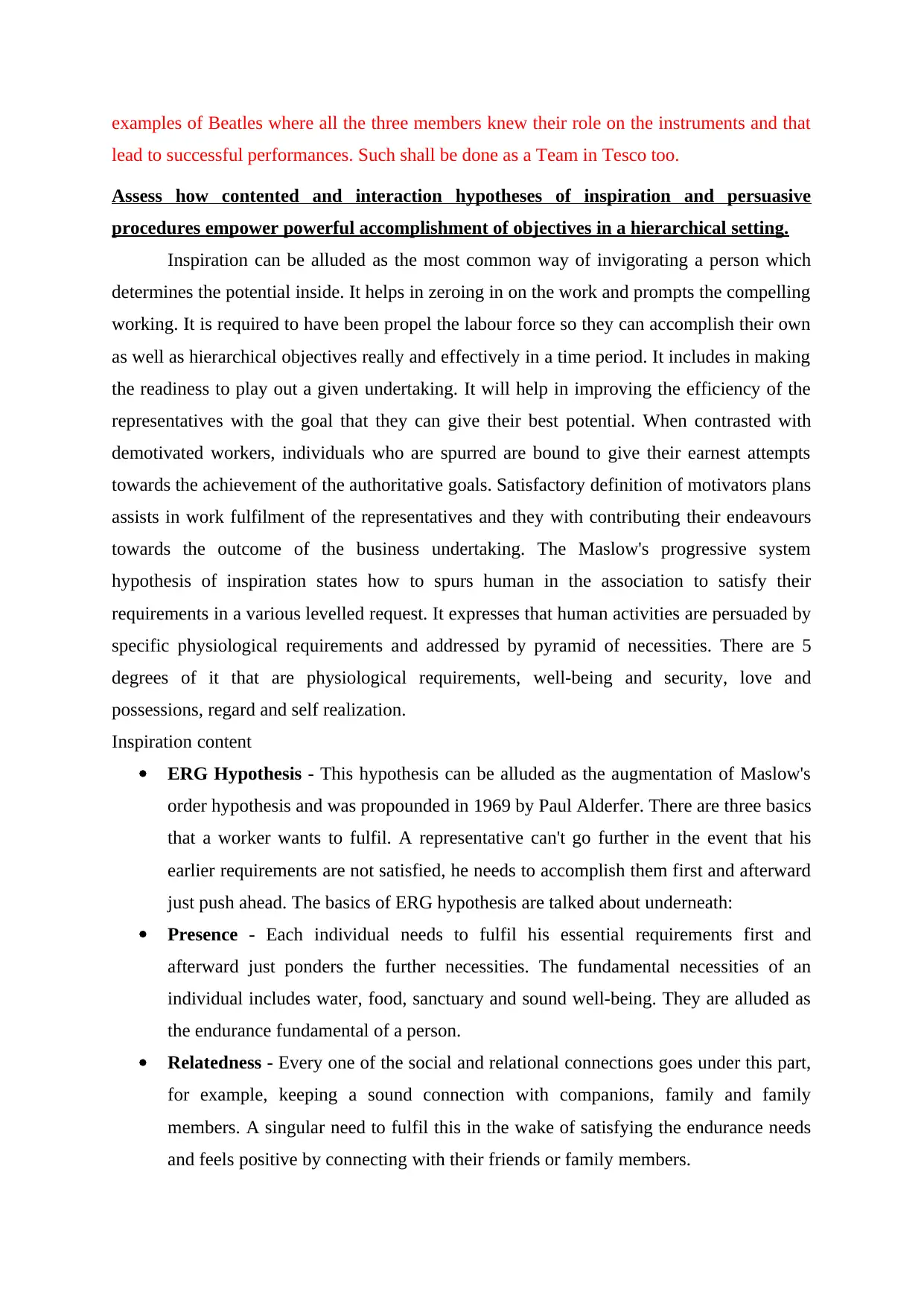
examples of Beatles where all the three members knew their role on the instruments and that
lead to successful performances. Such shall be done as a Team in Tesco too.
Assess how contented and interaction hypotheses of inspiration and persuasive
procedures empower powerful accomplishment of objectives in a hierarchical setting.
Inspiration can be alluded as the most common way of invigorating a person which
determines the potential inside. It helps in zeroing in on the work and prompts the compelling
working. It is required to have been propel the labour force so they can accomplish their own
as well as hierarchical objectives really and effectively in a time period. It includes in making
the readiness to play out a given undertaking. It will help in improving the efficiency of the
representatives with the goal that they can give their best potential. When contrasted with
demotivated workers, individuals who are spurred are bound to give their earnest attempts
towards the achievement of the authoritative goals. Satisfactory definition of motivators plans
assists in work fulfilment of the representatives and they with contributing their endeavours
towards the outcome of the business undertaking. The Maslow's progressive system
hypothesis of inspiration states how to spurs human in the association to satisfy their
requirements in a various levelled request. It expresses that human activities are persuaded by
specific physiological requirements and addressed by pyramid of necessities. There are 5
degrees of it that are physiological requirements, well-being and security, love and
possessions, regard and self realization.
Inspiration content
ERG Hypothesis - This hypothesis can be alluded as the augmentation of Maslow's
order hypothesis and was propounded in 1969 by Paul Alderfer. There are three basics
that a worker wants to fulfil. A representative can't go further in the event that his
earlier requirements are not satisfied, he needs to accomplish them first and afterward
just push ahead. The basics of ERG hypothesis are talked about underneath:
Presence - Each individual needs to fulfil his essential requirements first and
afterward just ponders the further necessities. The fundamental necessities of an
individual includes water, food, sanctuary and sound well-being. They are alluded as
the endurance fundamental of a person.
Relatedness - Every one of the social and relational connections goes under this part,
for example, keeping a sound connection with companions, family and family
members. A singular need to fulfil this in the wake of satisfying the endurance needs
and feels positive by connecting with their friends or family members.
lead to successful performances. Such shall be done as a Team in Tesco too.
Assess how contented and interaction hypotheses of inspiration and persuasive
procedures empower powerful accomplishment of objectives in a hierarchical setting.
Inspiration can be alluded as the most common way of invigorating a person which
determines the potential inside. It helps in zeroing in on the work and prompts the compelling
working. It is required to have been propel the labour force so they can accomplish their own
as well as hierarchical objectives really and effectively in a time period. It includes in making
the readiness to play out a given undertaking. It will help in improving the efficiency of the
representatives with the goal that they can give their best potential. When contrasted with
demotivated workers, individuals who are spurred are bound to give their earnest attempts
towards the achievement of the authoritative goals. Satisfactory definition of motivators plans
assists in work fulfilment of the representatives and they with contributing their endeavours
towards the outcome of the business undertaking. The Maslow's progressive system
hypothesis of inspiration states how to spurs human in the association to satisfy their
requirements in a various levelled request. It expresses that human activities are persuaded by
specific physiological requirements and addressed by pyramid of necessities. There are 5
degrees of it that are physiological requirements, well-being and security, love and
possessions, regard and self realization.
Inspiration content
ERG Hypothesis - This hypothesis can be alluded as the augmentation of Maslow's
order hypothesis and was propounded in 1969 by Paul Alderfer. There are three basics
that a worker wants to fulfil. A representative can't go further in the event that his
earlier requirements are not satisfied, he needs to accomplish them first and afterward
just push ahead. The basics of ERG hypothesis are talked about underneath:
Presence - Each individual needs to fulfil his essential requirements first and
afterward just ponders the further necessities. The fundamental necessities of an
individual includes water, food, sanctuary and sound well-being. They are alluded as
the endurance fundamental of a person.
Relatedness - Every one of the social and relational connections goes under this part,
for example, keeping a sound connection with companions, family and family
members. A singular need to fulfil this in the wake of satisfying the endurance needs
and feels positive by connecting with their friends or family members.
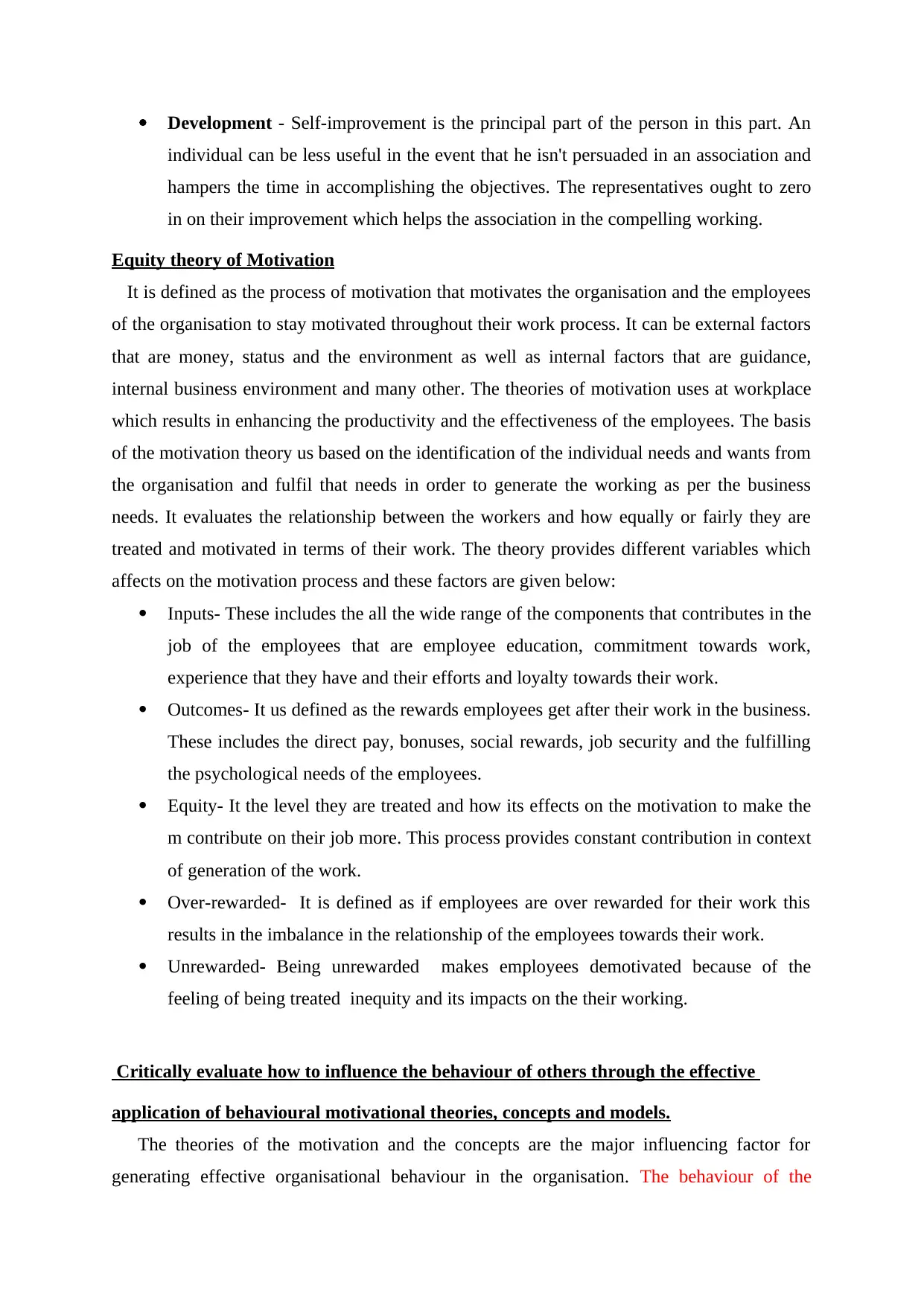
Development - Self-improvement is the principal part of the person in this part. An
individual can be less useful in the event that he isn't persuaded in an association and
hampers the time in accomplishing the objectives. The representatives ought to zero
in on their improvement which helps the association in the compelling working.
Equity theory of Motivation
It is defined as the process of motivation that motivates the organisation and the employees
of the organisation to stay motivated throughout their work process. It can be external factors
that are money, status and the environment as well as internal factors that are guidance,
internal business environment and many other. The theories of motivation uses at workplace
which results in enhancing the productivity and the effectiveness of the employees. The basis
of the motivation theory us based on the identification of the individual needs and wants from
the organisation and fulfil that needs in order to generate the working as per the business
needs. It evaluates the relationship between the workers and how equally or fairly they are
treated and motivated in terms of their work. The theory provides different variables which
affects on the motivation process and these factors are given below:
Inputs- These includes the all the wide range of the components that contributes in the
job of the employees that are employee education, commitment towards work,
experience that they have and their efforts and loyalty towards their work.
Outcomes- It us defined as the rewards employees get after their work in the business.
These includes the direct pay, bonuses, social rewards, job security and the fulfilling
the psychological needs of the employees.
Equity- It the level they are treated and how its effects on the motivation to make the
m contribute on their job more. This process provides constant contribution in context
of generation of the work.
Over-rewarded- It is defined as if employees are over rewarded for their work this
results in the imbalance in the relationship of the employees towards their work.
Unrewarded- Being unrewarded makes employees demotivated because of the
feeling of being treated inequity and its impacts on the their working.
Critically evaluate how to influence the behaviour of others through the effective
application of behavioural motivational theories, concepts and models.
The theories of the motivation and the concepts are the major influencing factor for
generating effective organisational behaviour in the organisation. The behaviour of the
individual can be less useful in the event that he isn't persuaded in an association and
hampers the time in accomplishing the objectives. The representatives ought to zero
in on their improvement which helps the association in the compelling working.
Equity theory of Motivation
It is defined as the process of motivation that motivates the organisation and the employees
of the organisation to stay motivated throughout their work process. It can be external factors
that are money, status and the environment as well as internal factors that are guidance,
internal business environment and many other. The theories of motivation uses at workplace
which results in enhancing the productivity and the effectiveness of the employees. The basis
of the motivation theory us based on the identification of the individual needs and wants from
the organisation and fulfil that needs in order to generate the working as per the business
needs. It evaluates the relationship between the workers and how equally or fairly they are
treated and motivated in terms of their work. The theory provides different variables which
affects on the motivation process and these factors are given below:
Inputs- These includes the all the wide range of the components that contributes in the
job of the employees that are employee education, commitment towards work,
experience that they have and their efforts and loyalty towards their work.
Outcomes- It us defined as the rewards employees get after their work in the business.
These includes the direct pay, bonuses, social rewards, job security and the fulfilling
the psychological needs of the employees.
Equity- It the level they are treated and how its effects on the motivation to make the
m contribute on their job more. This process provides constant contribution in context
of generation of the work.
Over-rewarded- It is defined as if employees are over rewarded for their work this
results in the imbalance in the relationship of the employees towards their work.
Unrewarded- Being unrewarded makes employees demotivated because of the
feeling of being treated inequity and its impacts on the their working.
Critically evaluate how to influence the behaviour of others through the effective
application of behavioural motivational theories, concepts and models.
The theories of the motivation and the concepts are the major influencing factor for
generating effective organisational behaviour in the organisation. The behaviour of the
Paraphrase This Document
Need a fresh take? Get an instant paraphrase of this document with our AI Paraphraser
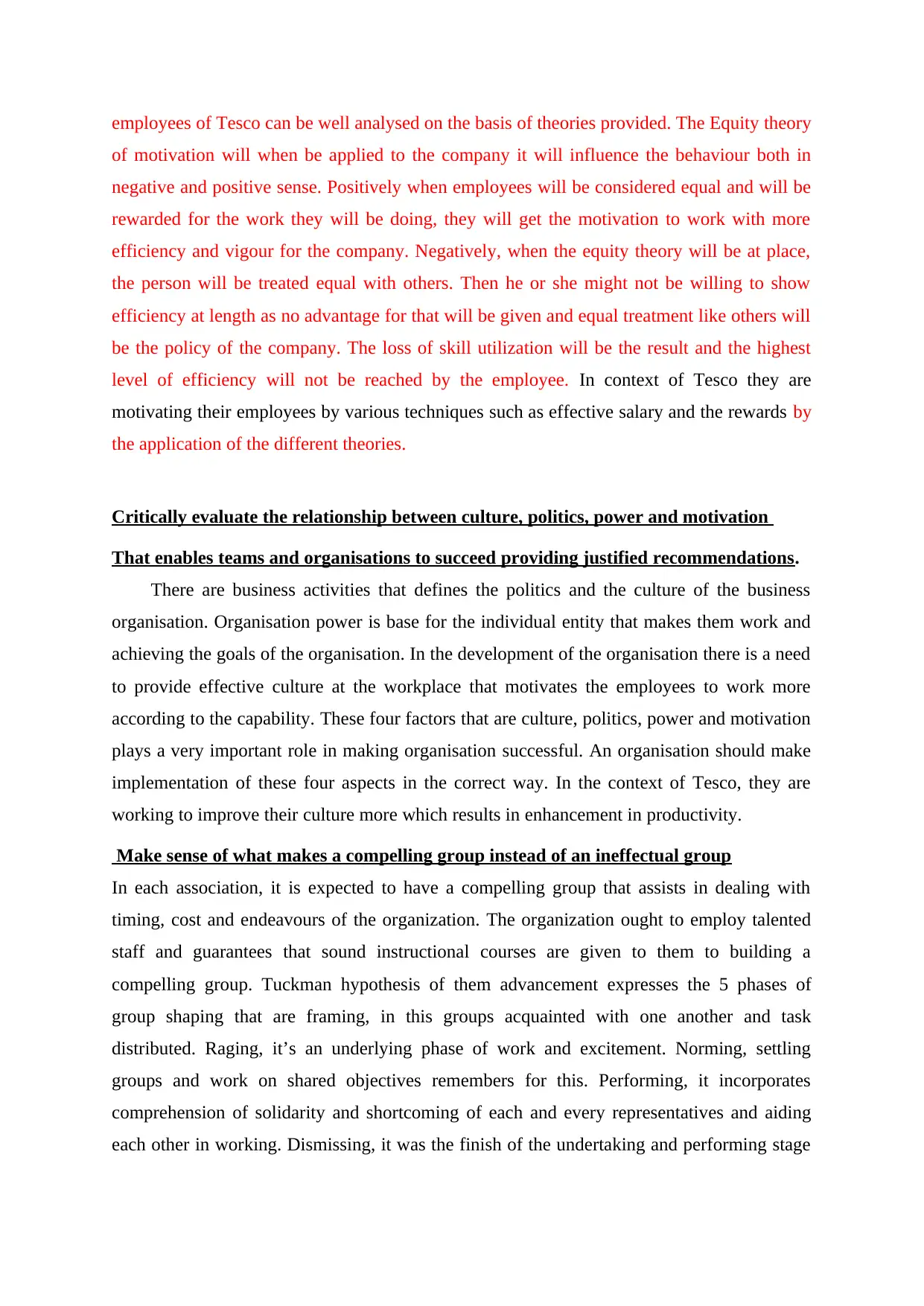
employees of Tesco can be well analysed on the basis of theories provided. The Equity theory
of motivation will when be applied to the company it will influence the behaviour both in
negative and positive sense. Positively when employees will be considered equal and will be
rewarded for the work they will be doing, they will get the motivation to work with more
efficiency and vigour for the company. Negatively, when the equity theory will be at place,
the person will be treated equal with others. Then he or she might not be willing to show
efficiency at length as no advantage for that will be given and equal treatment like others will
be the policy of the company. The loss of skill utilization will be the result and the highest
level of efficiency will not be reached by the employee. In context of Tesco they are
motivating their employees by various techniques such as effective salary and the rewards by
the application of the different theories.
Critically evaluate the relationship between culture, politics, power and motivation
That enables teams and organisations to succeed providing justified recommendations.
There are business activities that defines the politics and the culture of the business
organisation. Organisation power is base for the individual entity that makes them work and
achieving the goals of the organisation. In the development of the organisation there is a need
to provide effective culture at the workplace that motivates the employees to work more
according to the capability. These four factors that are culture, politics, power and motivation
plays a very important role in making organisation successful. An organisation should make
implementation of these four aspects in the correct way. In the context of Tesco, they are
working to improve their culture more which results in enhancement in productivity.
Make sense of what makes a compelling group instead of an ineffectual group
In each association, it is expected to have a compelling group that assists in dealing with
timing, cost and endeavours of the organization. The organization ought to employ talented
staff and guarantees that sound instructional courses are given to them to building a
compelling group. Tuckman hypothesis of them advancement expresses the 5 phases of
group shaping that are framing, in this groups acquainted with one another and task
distributed. Raging, it’s an underlying phase of work and excitement. Norming, settling
groups and work on shared objectives remembers for this. Performing, it incorporates
comprehension of solidarity and shortcoming of each and every representatives and aiding
each other in working. Dismissing, it was the finish of the undertaking and performing stage
of motivation will when be applied to the company it will influence the behaviour both in
negative and positive sense. Positively when employees will be considered equal and will be
rewarded for the work they will be doing, they will get the motivation to work with more
efficiency and vigour for the company. Negatively, when the equity theory will be at place,
the person will be treated equal with others. Then he or she might not be willing to show
efficiency at length as no advantage for that will be given and equal treatment like others will
be the policy of the company. The loss of skill utilization will be the result and the highest
level of efficiency will not be reached by the employee. In context of Tesco they are
motivating their employees by various techniques such as effective salary and the rewards by
the application of the different theories.
Critically evaluate the relationship between culture, politics, power and motivation
That enables teams and organisations to succeed providing justified recommendations.
There are business activities that defines the politics and the culture of the business
organisation. Organisation power is base for the individual entity that makes them work and
achieving the goals of the organisation. In the development of the organisation there is a need
to provide effective culture at the workplace that motivates the employees to work more
according to the capability. These four factors that are culture, politics, power and motivation
plays a very important role in making organisation successful. An organisation should make
implementation of these four aspects in the correct way. In the context of Tesco, they are
working to improve their culture more which results in enhancement in productivity.
Make sense of what makes a compelling group instead of an ineffectual group
In each association, it is expected to have a compelling group that assists in dealing with
timing, cost and endeavours of the organization. The organization ought to employ talented
staff and guarantees that sound instructional courses are given to them to building a
compelling group. Tuckman hypothesis of them advancement expresses the 5 phases of
group shaping that are framing, in this groups acquainted with one another and task
distributed. Raging, it’s an underlying phase of work and excitement. Norming, settling
groups and work on shared objectives remembers for this. Performing, it incorporates
comprehension of solidarity and shortcoming of each and every representatives and aiding
each other in working. Dismissing, it was the finish of the undertaking and performing stage
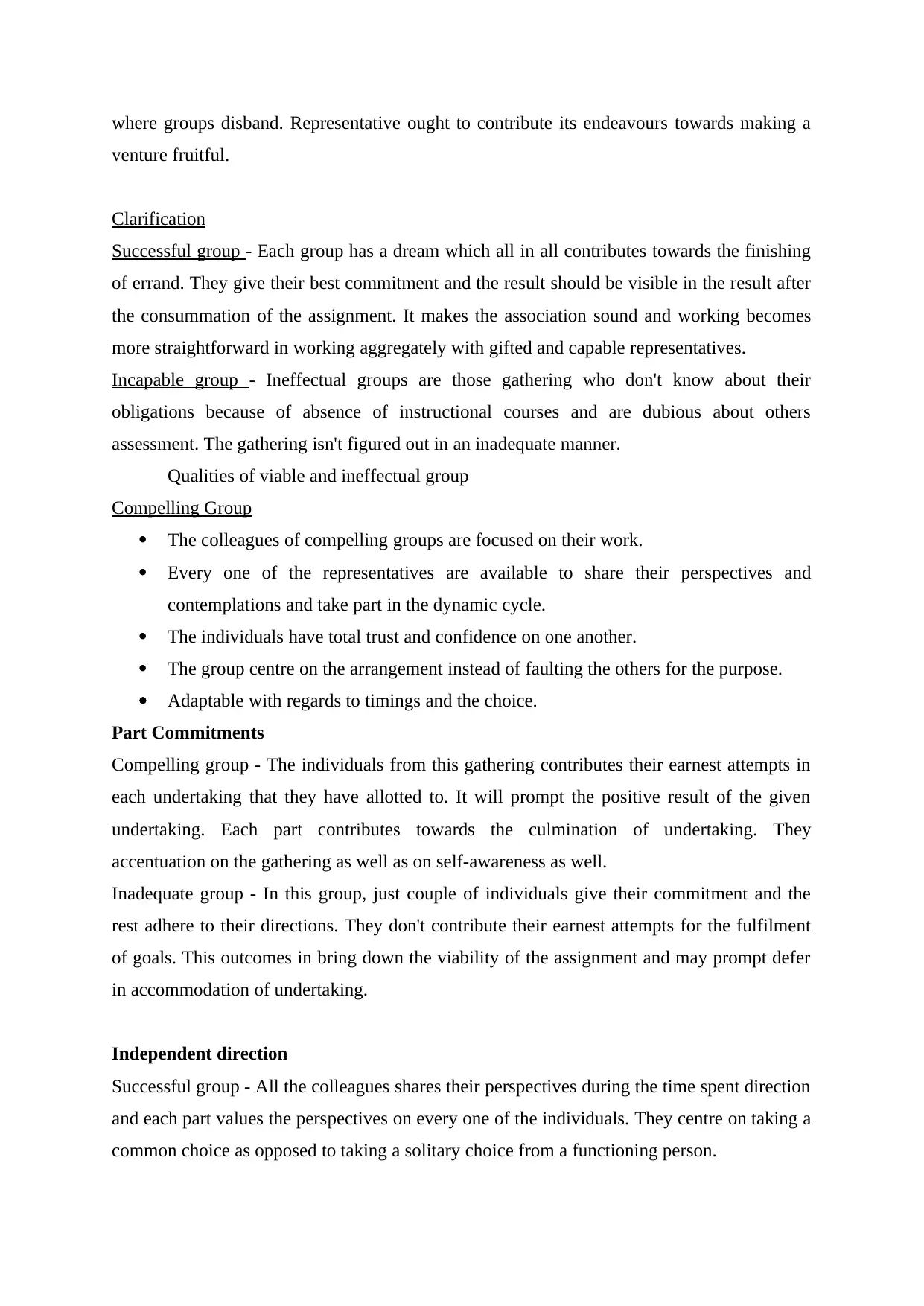
where groups disband. Representative ought to contribute its endeavours towards making a
venture fruitful.
Clarification
Successful group - Each group has a dream which all in all contributes towards the finishing
of errand. They give their best commitment and the result should be visible in the result after
the consummation of the assignment. It makes the association sound and working becomes
more straightforward in working aggregately with gifted and capable representatives.
Incapable group - Ineffectual groups are those gathering who don't know about their
obligations because of absence of instructional courses and are dubious about others
assessment. The gathering isn't figured out in an inadequate manner.
Qualities of viable and ineffectual group
Compelling Group
The colleagues of compelling groups are focused on their work.
Every one of the representatives are available to share their perspectives and
contemplations and take part in the dynamic cycle.
The individuals have total trust and confidence on one another.
The group centre on the arrangement instead of faulting the others for the purpose.
Adaptable with regards to timings and the choice.
Part Commitments
Compelling group - The individuals from this gathering contributes their earnest attempts in
each undertaking that they have allotted to. It will prompt the positive result of the given
undertaking. Each part contributes towards the culmination of undertaking. They
accentuation on the gathering as well as on self-awareness as well.
Inadequate group - In this group, just couple of individuals give their commitment and the
rest adhere to their directions. They don't contribute their earnest attempts for the fulfilment
of goals. This outcomes in bring down the viability of the assignment and may prompt defer
in accommodation of undertaking.
Independent direction
Successful group - All the colleagues shares their perspectives during the time spent direction
and each part values the perspectives on every one of the individuals. They centre on taking a
common choice as opposed to taking a solitary choice from a functioning person.
venture fruitful.
Clarification
Successful group - Each group has a dream which all in all contributes towards the finishing
of errand. They give their best commitment and the result should be visible in the result after
the consummation of the assignment. It makes the association sound and working becomes
more straightforward in working aggregately with gifted and capable representatives.
Incapable group - Ineffectual groups are those gathering who don't know about their
obligations because of absence of instructional courses and are dubious about others
assessment. The gathering isn't figured out in an inadequate manner.
Qualities of viable and ineffectual group
Compelling Group
The colleagues of compelling groups are focused on their work.
Every one of the representatives are available to share their perspectives and
contemplations and take part in the dynamic cycle.
The individuals have total trust and confidence on one another.
The group centre on the arrangement instead of faulting the others for the purpose.
Adaptable with regards to timings and the choice.
Part Commitments
Compelling group - The individuals from this gathering contributes their earnest attempts in
each undertaking that they have allotted to. It will prompt the positive result of the given
undertaking. Each part contributes towards the culmination of undertaking. They
accentuation on the gathering as well as on self-awareness as well.
Inadequate group - In this group, just couple of individuals give their commitment and the
rest adhere to their directions. They don't contribute their earnest attempts for the fulfilment
of goals. This outcomes in bring down the viability of the assignment and may prompt defer
in accommodation of undertaking.
Independent direction
Successful group - All the colleagues shares their perspectives during the time spent direction
and each part values the perspectives on every one of the individuals. They centre on taking a
common choice as opposed to taking a solitary choice from a functioning person.
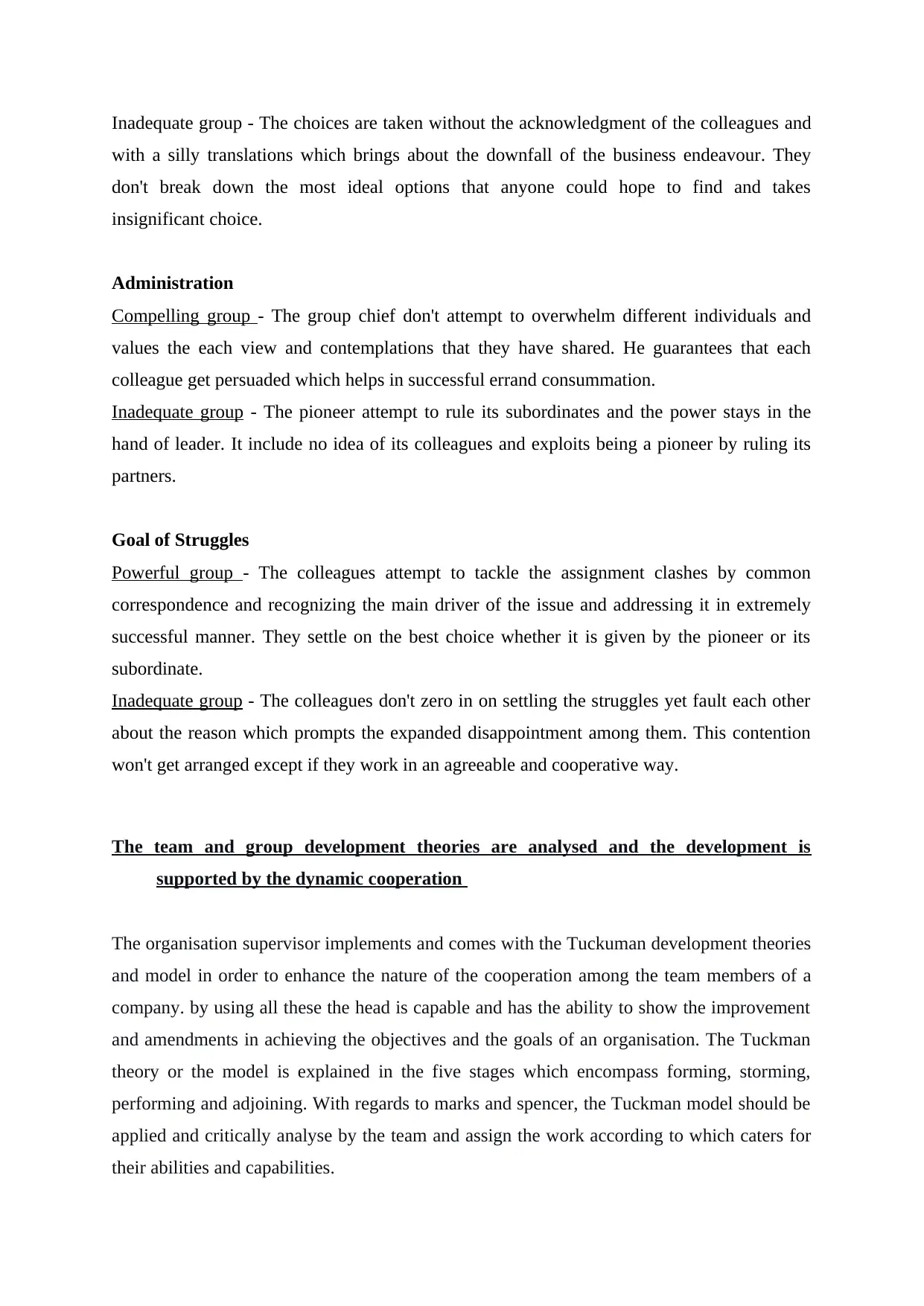
Inadequate group - The choices are taken without the acknowledgment of the colleagues and
with a silly translations which brings about the downfall of the business endeavour. They
don't break down the most ideal options that anyone could hope to find and takes
insignificant choice.
Administration
Compelling group - The group chief don't attempt to overwhelm different individuals and
values the each view and contemplations that they have shared. He guarantees that each
colleague get persuaded which helps in successful errand consummation.
Inadequate group - The pioneer attempt to rule its subordinates and the power stays in the
hand of leader. It include no idea of its colleagues and exploits being a pioneer by ruling its
partners.
Goal of Struggles
Powerful group - The colleagues attempt to tackle the assignment clashes by common
correspondence and recognizing the main driver of the issue and addressing it in extremely
successful manner. They settle on the best choice whether it is given by the pioneer or its
subordinate.
Inadequate group - The colleagues don't zero in on settling the struggles yet fault each other
about the reason which prompts the expanded disappointment among them. This contention
won't get arranged except if they work in an agreeable and cooperative way.
The team and group development theories are analysed and the development is
supported by the dynamic cooperation
The organisation supervisor implements and comes with the Tuckuman development theories
and model in order to enhance the nature of the cooperation among the team members of a
company. by using all these the head is capable and has the ability to show the improvement
and amendments in achieving the objectives and the goals of an organisation. The Tuckman
theory or the model is explained in the five stages which encompass forming, storming,
performing and adjoining. With regards to marks and spencer, the Tuckman model should be
applied and critically analyse by the team and assign the work according to which caters for
their abilities and capabilities.
with a silly translations which brings about the downfall of the business endeavour. They
don't break down the most ideal options that anyone could hope to find and takes
insignificant choice.
Administration
Compelling group - The group chief don't attempt to overwhelm different individuals and
values the each view and contemplations that they have shared. He guarantees that each
colleague get persuaded which helps in successful errand consummation.
Inadequate group - The pioneer attempt to rule its subordinates and the power stays in the
hand of leader. It include no idea of its colleagues and exploits being a pioneer by ruling its
partners.
Goal of Struggles
Powerful group - The colleagues attempt to tackle the assignment clashes by common
correspondence and recognizing the main driver of the issue and addressing it in extremely
successful manner. They settle on the best choice whether it is given by the pioneer or its
subordinate.
Inadequate group - The colleagues don't zero in on settling the struggles yet fault each other
about the reason which prompts the expanded disappointment among them. This contention
won't get arranged except if they work in an agreeable and cooperative way.
The team and group development theories are analysed and the development is
supported by the dynamic cooperation
The organisation supervisor implements and comes with the Tuckuman development theories
and model in order to enhance the nature of the cooperation among the team members of a
company. by using all these the head is capable and has the ability to show the improvement
and amendments in achieving the objectives and the goals of an organisation. The Tuckman
theory or the model is explained in the five stages which encompass forming, storming,
performing and adjoining. With regards to marks and spencer, the Tuckman model should be
applied and critically analyse by the team and assign the work according to which caters for
their abilities and capabilities.
Secure Best Marks with AI Grader
Need help grading? Try our AI Grader for instant feedback on your assignments.
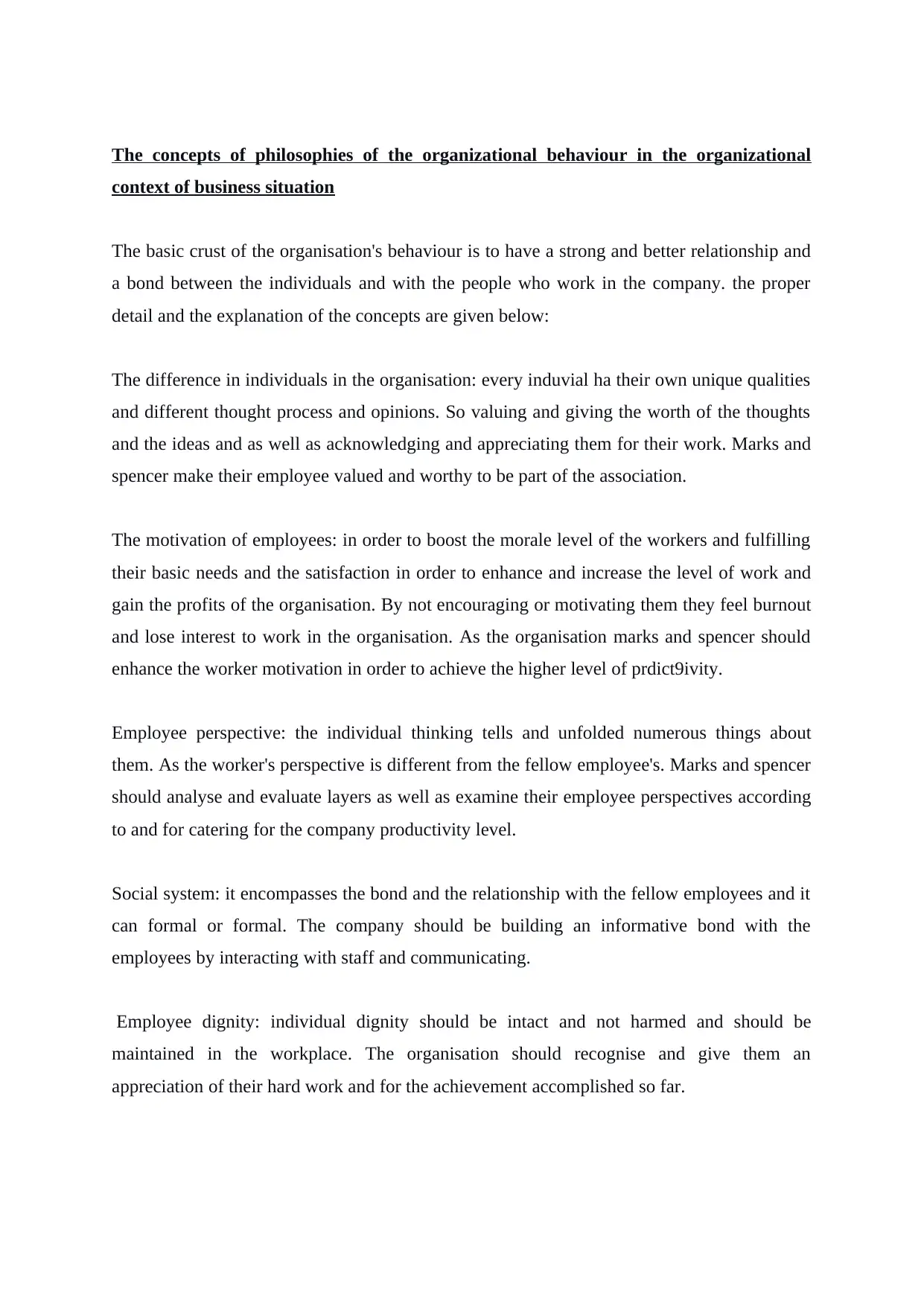
The concepts of philosophies of the organizational behaviour in the organizational
context of business situation
The basic crust of the organisation's behaviour is to have a strong and better relationship and
a bond between the individuals and with the people who work in the company. the proper
detail and the explanation of the concepts are given below:
The difference in individuals in the organisation: every induvial ha their own unique qualities
and different thought process and opinions. So valuing and giving the worth of the thoughts
and the ideas and as well as acknowledging and appreciating them for their work. Marks and
spencer make their employee valued and worthy to be part of the association.
The motivation of employees: in order to boost the morale level of the workers and fulfilling
their basic needs and the satisfaction in order to enhance and increase the level of work and
gain the profits of the organisation. By not encouraging or motivating them they feel burnout
and lose interest to work in the organisation. As the organisation marks and spencer should
enhance the worker motivation in order to achieve the higher level of prdict9ivity.
Employee perspective: the individual thinking tells and unfolded numerous things about
them. As the worker's perspective is different from the fellow employee's. Marks and spencer
should analyse and evaluate layers as well as examine their employee perspectives according
to and for catering for the company productivity level.
Social system: it encompasses the bond and the relationship with the fellow employees and it
can formal or formal. The company should be building an informative bond with the
employees by interacting with staff and communicating.
Employee dignity: individual dignity should be intact and not harmed and should be
maintained in the workplace. The organisation should recognise and give them an
appreciation of their hard work and for the achievement accomplished so far.
context of business situation
The basic crust of the organisation's behaviour is to have a strong and better relationship and
a bond between the individuals and with the people who work in the company. the proper
detail and the explanation of the concepts are given below:
The difference in individuals in the organisation: every induvial ha their own unique qualities
and different thought process and opinions. So valuing and giving the worth of the thoughts
and the ideas and as well as acknowledging and appreciating them for their work. Marks and
spencer make their employee valued and worthy to be part of the association.
The motivation of employees: in order to boost the morale level of the workers and fulfilling
their basic needs and the satisfaction in order to enhance and increase the level of work and
gain the profits of the organisation. By not encouraging or motivating them they feel burnout
and lose interest to work in the organisation. As the organisation marks and spencer should
enhance the worker motivation in order to achieve the higher level of prdict9ivity.
Employee perspective: the individual thinking tells and unfolded numerous things about
them. As the worker's perspective is different from the fellow employee's. Marks and spencer
should analyse and evaluate layers as well as examine their employee perspectives according
to and for catering for the company productivity level.
Social system: it encompasses the bond and the relationship with the fellow employees and it
can formal or formal. The company should be building an informative bond with the
employees by interacting with staff and communicating.
Employee dignity: individual dignity should be intact and not harmed and should be
maintained in the workplace. The organisation should recognise and give them an
appreciation of their hard work and for the achievement accomplished so far.
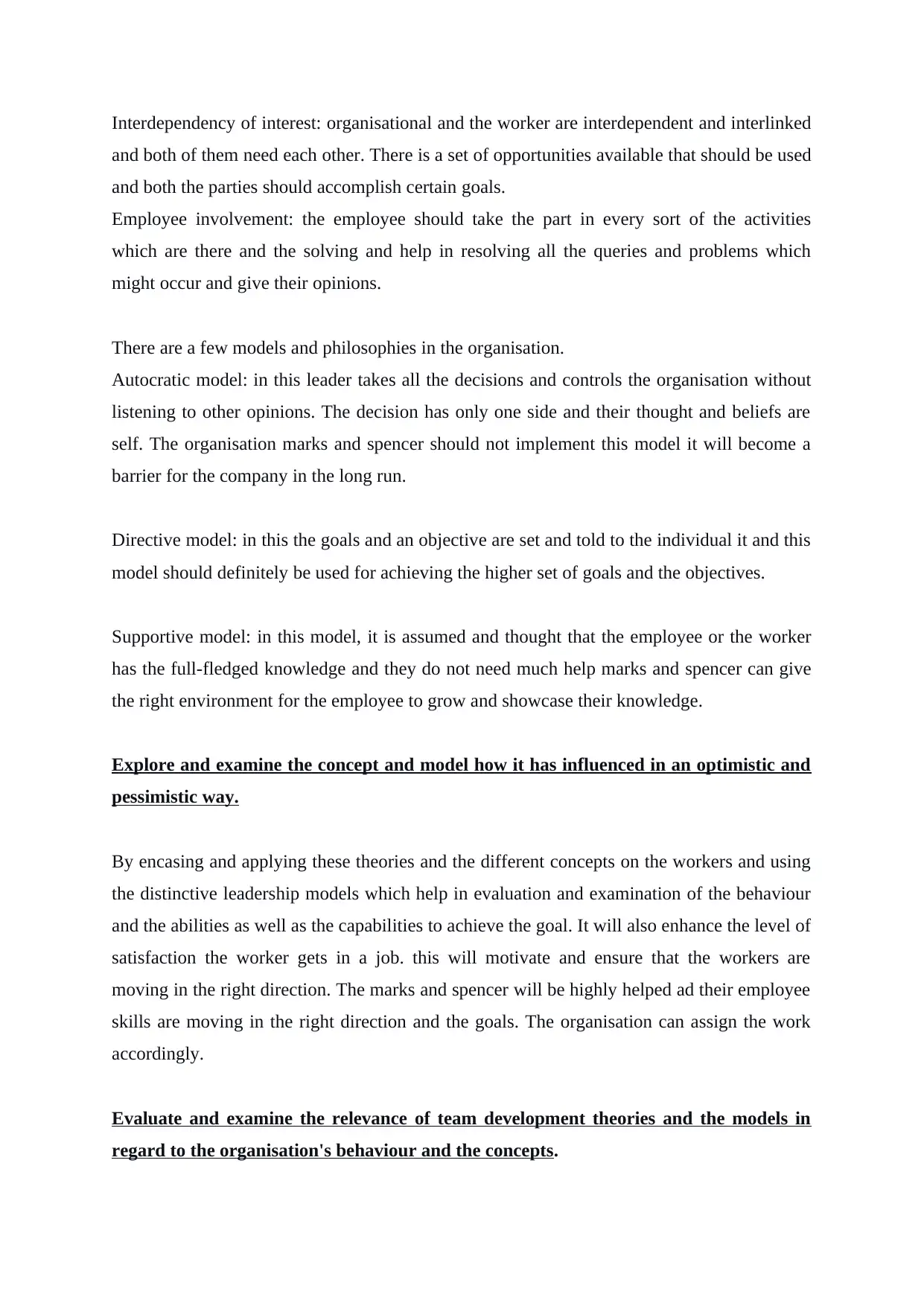
Interdependency of interest: organisational and the worker are interdependent and interlinked
and both of them need each other. There is a set of opportunities available that should be used
and both the parties should accomplish certain goals.
Employee involvement: the employee should take the part in every sort of the activities
which are there and the solving and help in resolving all the queries and problems which
might occur and give their opinions.
There are a few models and philosophies in the organisation.
Autocratic model: in this leader takes all the decisions and controls the organisation without
listening to other opinions. The decision has only one side and their thought and beliefs are
self. The organisation marks and spencer should not implement this model it will become a
barrier for the company in the long run.
Directive model: in this the goals and an objective are set and told to the individual it and this
model should definitely be used for achieving the higher set of goals and the objectives.
Supportive model: in this model, it is assumed and thought that the employee or the worker
has the full-fledged knowledge and they do not need much help marks and spencer can give
the right environment for the employee to grow and showcase their knowledge.
Explore and examine the concept and model how it has influenced in an optimistic and
pessimistic way.
By encasing and applying these theories and the different concepts on the workers and using
the distinctive leadership models which help in evaluation and examination of the behaviour
and the abilities as well as the capabilities to achieve the goal. It will also enhance the level of
satisfaction the worker gets in a job. this will motivate and ensure that the workers are
moving in the right direction. The marks and spencer will be highly helped ad their employee
skills are moving in the right direction and the goals. The organisation can assign the work
accordingly.
Evaluate and examine the relevance of team development theories and the models in
regard to the organisation's behaviour and the concepts.
and both of them need each other. There is a set of opportunities available that should be used
and both the parties should accomplish certain goals.
Employee involvement: the employee should take the part in every sort of the activities
which are there and the solving and help in resolving all the queries and problems which
might occur and give their opinions.
There are a few models and philosophies in the organisation.
Autocratic model: in this leader takes all the decisions and controls the organisation without
listening to other opinions. The decision has only one side and their thought and beliefs are
self. The organisation marks and spencer should not implement this model it will become a
barrier for the company in the long run.
Directive model: in this the goals and an objective are set and told to the individual it and this
model should definitely be used for achieving the higher set of goals and the objectives.
Supportive model: in this model, it is assumed and thought that the employee or the worker
has the full-fledged knowledge and they do not need much help marks and spencer can give
the right environment for the employee to grow and showcase their knowledge.
Explore and examine the concept and model how it has influenced in an optimistic and
pessimistic way.
By encasing and applying these theories and the different concepts on the workers and using
the distinctive leadership models which help in evaluation and examination of the behaviour
and the abilities as well as the capabilities to achieve the goal. It will also enhance the level of
satisfaction the worker gets in a job. this will motivate and ensure that the workers are
moving in the right direction. The marks and spencer will be highly helped ad their employee
skills are moving in the right direction and the goals. The organisation can assign the work
accordingly.
Evaluate and examine the relevance of team development theories and the models in
regard to the organisation's behaviour and the concepts.
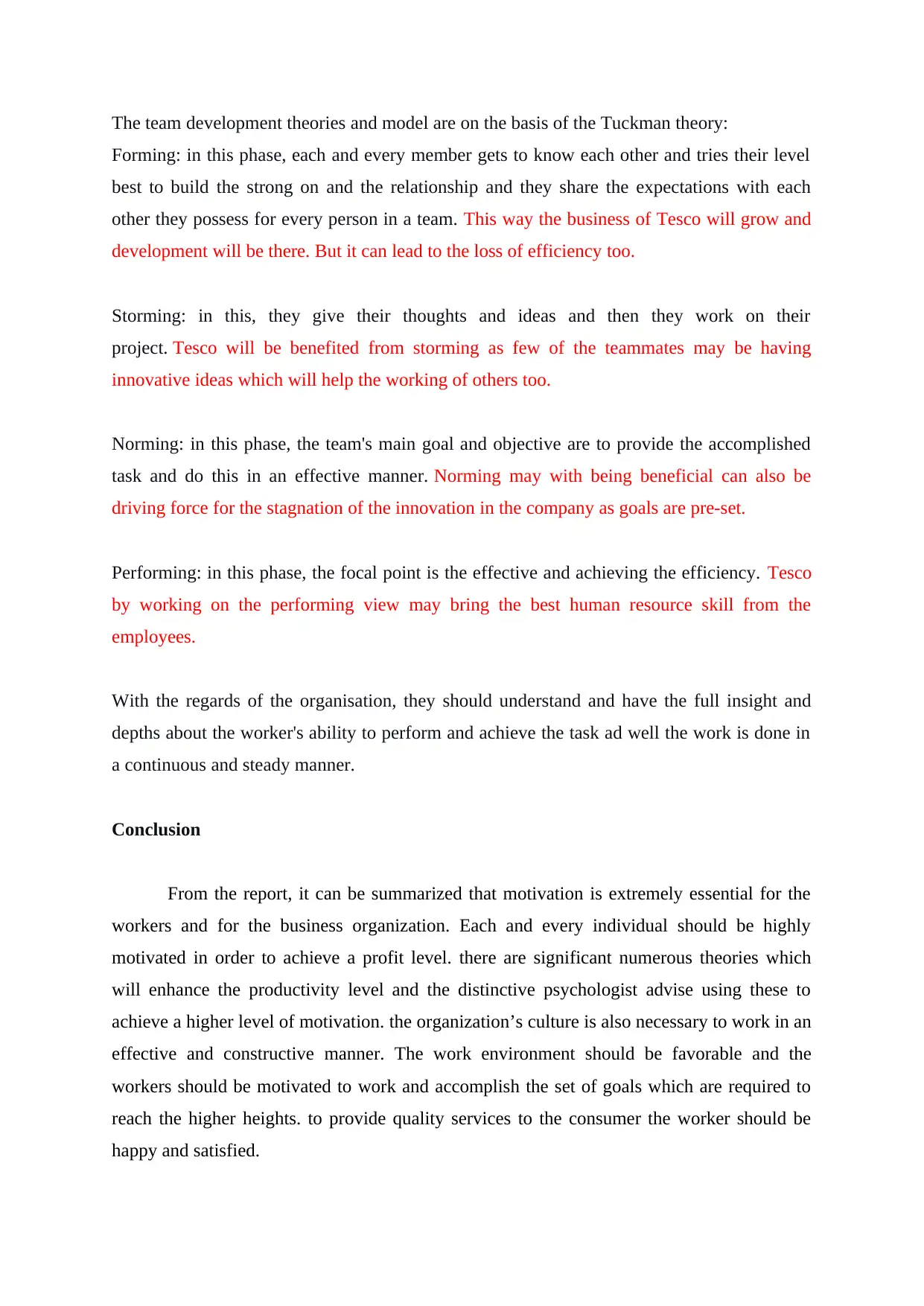
The team development theories and model are on the basis of the Tuckman theory:
Forming: in this phase, each and every member gets to know each other and tries their level
best to build the strong on and the relationship and they share the expectations with each
other they possess for every person in a team. This way the business of Tesco will grow and
development will be there. But it can lead to the loss of efficiency too.
Storming: in this, they give their thoughts and ideas and then they work on their
project. Tesco will be benefited from storming as few of the teammates may be having
innovative ideas which will help the working of others too.
Norming: in this phase, the team's main goal and objective are to provide the accomplished
task and do this in an effective manner. Norming may with being beneficial can also be
driving force for the stagnation of the innovation in the company as goals are pre-set.
Performing: in this phase, the focal point is the effective and achieving the efficiency. Tesco
by working on the performing view may bring the best human resource skill from the
employees.
With the regards of the organisation, they should understand and have the full insight and
depths about the worker's ability to perform and achieve the task ad well the work is done in
a continuous and steady manner.
Conclusion
From the report, it can be summarized that motivation is extremely essential for the
workers and for the business organization. Each and every individual should be highly
motivated in order to achieve a profit level. there are significant numerous theories which
will enhance the productivity level and the distinctive psychologist advise using these to
achieve a higher level of motivation. the organization’s culture is also necessary to work in an
effective and constructive manner. The work environment should be favorable and the
workers should be motivated to work and accomplish the set of goals which are required to
reach the higher heights. to provide quality services to the consumer the worker should be
happy and satisfied.
Forming: in this phase, each and every member gets to know each other and tries their level
best to build the strong on and the relationship and they share the expectations with each
other they possess for every person in a team. This way the business of Tesco will grow and
development will be there. But it can lead to the loss of efficiency too.
Storming: in this, they give their thoughts and ideas and then they work on their
project. Tesco will be benefited from storming as few of the teammates may be having
innovative ideas which will help the working of others too.
Norming: in this phase, the team's main goal and objective are to provide the accomplished
task and do this in an effective manner. Norming may with being beneficial can also be
driving force for the stagnation of the innovation in the company as goals are pre-set.
Performing: in this phase, the focal point is the effective and achieving the efficiency. Tesco
by working on the performing view may bring the best human resource skill from the
employees.
With the regards of the organisation, they should understand and have the full insight and
depths about the worker's ability to perform and achieve the task ad well the work is done in
a continuous and steady manner.
Conclusion
From the report, it can be summarized that motivation is extremely essential for the
workers and for the business organization. Each and every individual should be highly
motivated in order to achieve a profit level. there are significant numerous theories which
will enhance the productivity level and the distinctive psychologist advise using these to
achieve a higher level of motivation. the organization’s culture is also necessary to work in an
effective and constructive manner. The work environment should be favorable and the
workers should be motivated to work and accomplish the set of goals which are required to
reach the higher heights. to provide quality services to the consumer the worker should be
happy and satisfied.
Paraphrase This Document
Need a fresh take? Get an instant paraphrase of this document with our AI Paraphraser

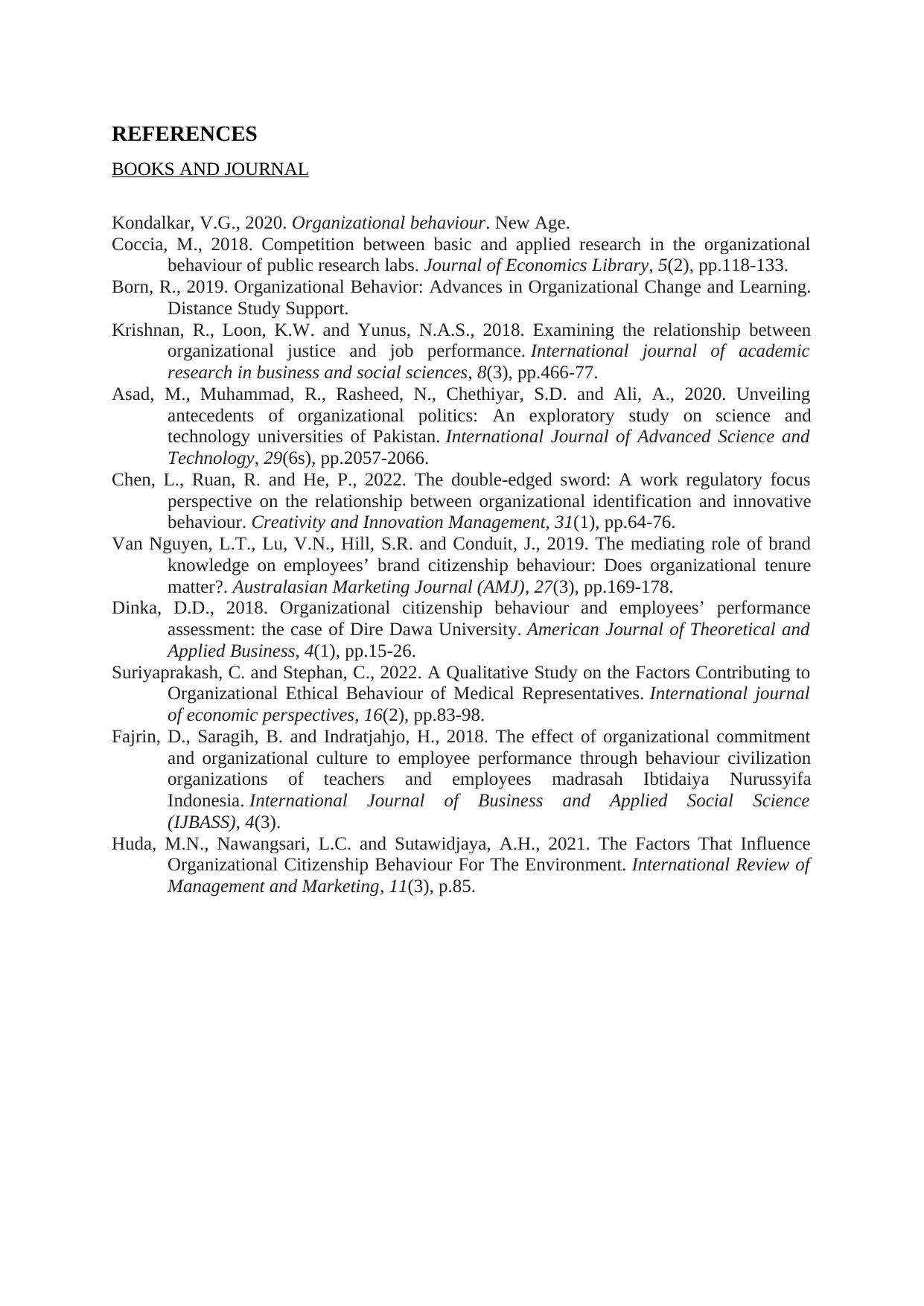
REFERENCES
BOOKS AND JOURNAL
Kondalkar, V.G., 2020. Organizational behaviour. New Age.
Coccia, M., 2018. Competition between basic and applied research in the organizational
behaviour of public research labs. Journal of Economics Library, 5(2), pp.118-133.
Born, R., 2019. Organizational Behavior: Advances in Organizational Change and Learning.
Distance Study Support.
Krishnan, R., Loon, K.W. and Yunus, N.A.S., 2018. Examining the relationship between
organizational justice and job performance. International journal of academic
research in business and social sciences, 8(3), pp.466-77.
Asad, M., Muhammad, R., Rasheed, N., Chethiyar, S.D. and Ali, A., 2020. Unveiling
antecedents of organizational politics: An exploratory study on science and
technology universities of Pakistan. International Journal of Advanced Science and
Technology, 29(6s), pp.2057-2066.
Chen, L., Ruan, R. and He, P., 2022. The double‐edged sword: A work regulatory focus
perspective on the relationship between organizational identification and innovative
behaviour. Creativity and Innovation Management, 31(1), pp.64-76.
Van Nguyen, L.T., Lu, V.N., Hill, S.R. and Conduit, J., 2019. The mediating role of brand
knowledge on employees’ brand citizenship behaviour: Does organizational tenure
matter?. Australasian Marketing Journal (AMJ), 27(3), pp.169-178.
Dinka, D.D., 2018. Organizational citizenship behaviour and employees’ performance
assessment: the case of Dire Dawa University. American Journal of Theoretical and
Applied Business, 4(1), pp.15-26.
Suriyaprakash, C. and Stephan, C., 2022. A Qualitative Study on the Factors Contributing to
Organizational Ethical Behaviour of Medical Representatives. International journal
of economic perspectives, 16(2), pp.83-98.
Fajrin, D., Saragih, B. and Indratjahjo, H., 2018. The effect of organizational commitment
and organizational culture to employee performance through behaviour civilization
organizations of teachers and employees madrasah Ibtidaiya Nurussyifa
Indonesia. International Journal of Business and Applied Social Science
(IJBASS), 4(3).
Huda, M.N., Nawangsari, L.C. and Sutawidjaya, A.H., 2021. The Factors That Influence
Organizational Citizenship Behaviour For The Environment. International Review of
Management and Marketing, 11(3), p.85.
BOOKS AND JOURNAL
Kondalkar, V.G., 2020. Organizational behaviour. New Age.
Coccia, M., 2018. Competition between basic and applied research in the organizational
behaviour of public research labs. Journal of Economics Library, 5(2), pp.118-133.
Born, R., 2019. Organizational Behavior: Advances in Organizational Change and Learning.
Distance Study Support.
Krishnan, R., Loon, K.W. and Yunus, N.A.S., 2018. Examining the relationship between
organizational justice and job performance. International journal of academic
research in business and social sciences, 8(3), pp.466-77.
Asad, M., Muhammad, R., Rasheed, N., Chethiyar, S.D. and Ali, A., 2020. Unveiling
antecedents of organizational politics: An exploratory study on science and
technology universities of Pakistan. International Journal of Advanced Science and
Technology, 29(6s), pp.2057-2066.
Chen, L., Ruan, R. and He, P., 2022. The double‐edged sword: A work regulatory focus
perspective on the relationship between organizational identification and innovative
behaviour. Creativity and Innovation Management, 31(1), pp.64-76.
Van Nguyen, L.T., Lu, V.N., Hill, S.R. and Conduit, J., 2019. The mediating role of brand
knowledge on employees’ brand citizenship behaviour: Does organizational tenure
matter?. Australasian Marketing Journal (AMJ), 27(3), pp.169-178.
Dinka, D.D., 2018. Organizational citizenship behaviour and employees’ performance
assessment: the case of Dire Dawa University. American Journal of Theoretical and
Applied Business, 4(1), pp.15-26.
Suriyaprakash, C. and Stephan, C., 2022. A Qualitative Study on the Factors Contributing to
Organizational Ethical Behaviour of Medical Representatives. International journal
of economic perspectives, 16(2), pp.83-98.
Fajrin, D., Saragih, B. and Indratjahjo, H., 2018. The effect of organizational commitment
and organizational culture to employee performance through behaviour civilization
organizations of teachers and employees madrasah Ibtidaiya Nurussyifa
Indonesia. International Journal of Business and Applied Social Science
(IJBASS), 4(3).
Huda, M.N., Nawangsari, L.C. and Sutawidjaya, A.H., 2021. The Factors That Influence
Organizational Citizenship Behaviour For The Environment. International Review of
Management and Marketing, 11(3), p.85.
1 out of 15
Related Documents
Your All-in-One AI-Powered Toolkit for Academic Success.
+13062052269
info@desklib.com
Available 24*7 on WhatsApp / Email
![[object Object]](/_next/static/media/star-bottom.7253800d.svg)
Unlock your academic potential
© 2024 | Zucol Services PVT LTD | All rights reserved.


